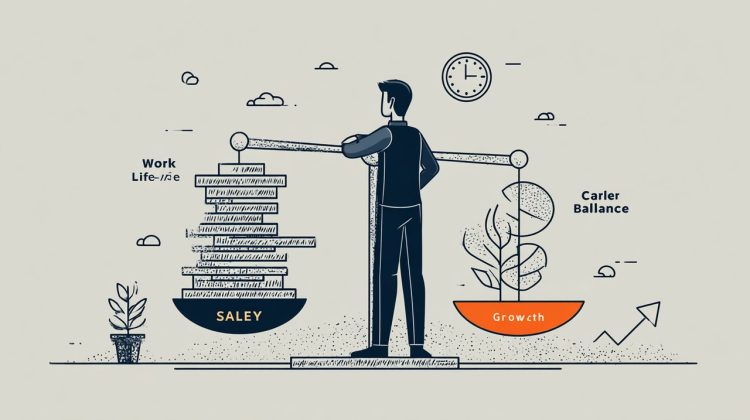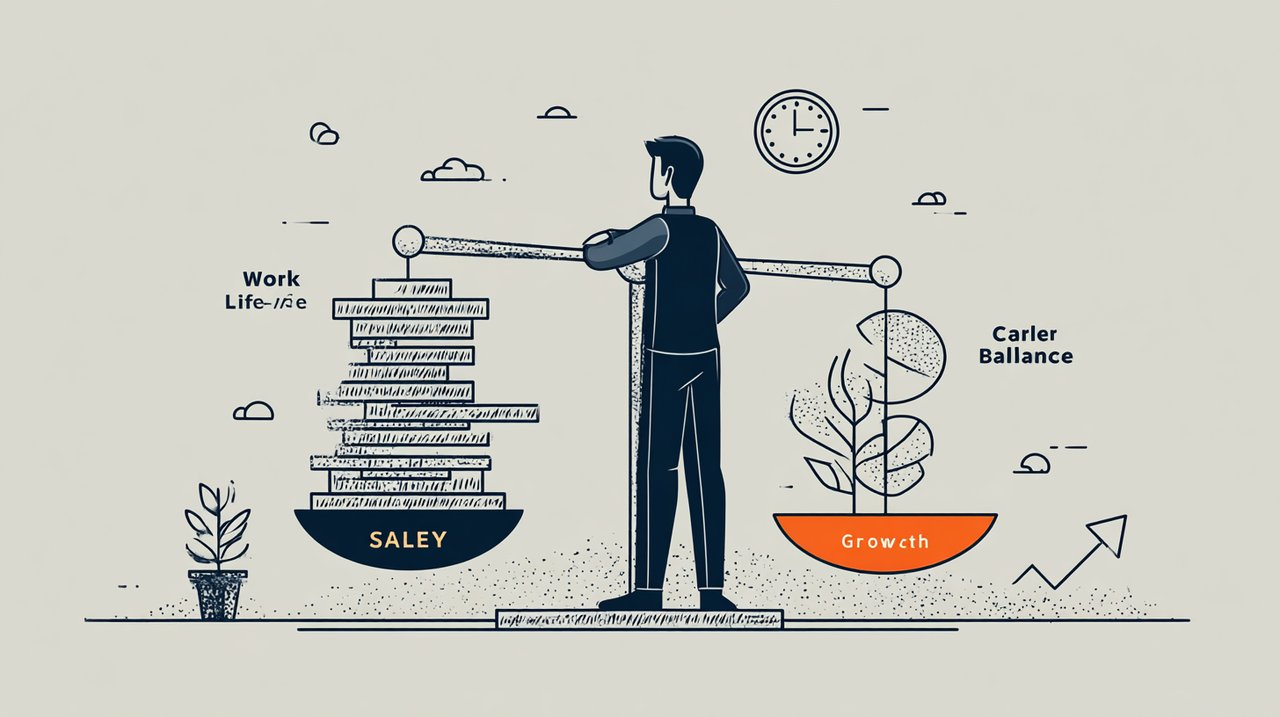Should I Change Jobs For A Higher Salary? A Holistic Guide To Career Decisions
The initial observation of a recent survey is compelling: over 60% of professionals contemplate a job change for a higher salary, yet a significant proportion—nearly half—express regret within a year. This striking dichotomy illuminates a fundamental challenge in career progression. This guide aims to transcend mere financial calculations, offering a holistic framework for career decisions that truly align with long-term professional and personal aspirations.
n n
n
Career Decisions: The Allure and Nuance of Higher Salary
Professionals frequently encounter a pivotal juncture, drawn by the undeniable allure of increased income. A higher salary promises enhanced financial security, greater discretionary spending, and the potential for an elevated quality of life. Yet, this immediate fiscal advantage often necessitates a careful consideration of its trade-offs against other critical dimensions of job satisfaction. These dimensions include the elusive equilibrium of work-life balance, the pervasive influence of company culture, and the vital avenues for career growth.
The pursuit of a more lucrative role, therefore, is seldom a simple arithmetic exercise; it demands a nuanced assessment, balancing tangible monetary rewards with the profound value of intrinsic fulfillment. Recognizing this inherent complexity is the foundational step toward orchestrating a truly informed career transition, thereby mitigating the risk of short-term financial gains culminating in prolonged professional dissatisfaction.
Beyond Salary: A Comprehensive Ledger of Gains and Trade-offs
A decision to transition roles, particularly when driven by financial considerations, mandates a comprehensive appraisal of all potential ramifications. Adopting a holistic perspective is paramount; it ensures that any such move harmonizes with one’s broader career trajectory and deeply held personal values, extending far beyond the immediate impact on a bank account.
Financial Growth and Career Trajectory
The advantages of pursuing a new role for enhanced compensation often transcend the immediate increment in salary. Such transitions frequently unlock avenues for accelerated financial advancement, manifesting as elevated base pay, more generous bonus structures, and superior stock option packages. Consider, for example, the significant long-term earning potential unlocked by moving from a junior to a senior position within a new organizational structure.
Beyond these direct financial incentives, a new role can strategically expose an individual to novel industries, cutting-edge technologies, or expanded responsibilities. This exposure, in turn, fosters the acquisition of valuable skills, broadens one’s professional network, and effectively paves the way for future promotions, potentially accelerating a trajectory towards leadership far beyond what might be achievable within a static environment.
Work-Life Balance Considerations
The inquiry into whether one should transition roles for an improved work-life balance has become a paramount consideration for a growing number of professionals. It is a common observation that a more substantial salary can, paradoxically, demand a heavier toll: extended working hours, heightened stress levels, or an arduous commute. For instance, a highly remunerated position in a fiercely competitive sector may necessitate frequent travel or late-night engagements, thereby impinging significantly on family commitments and personal well-being.
Conversely, it is equally true that some roles offering superior compensation also provide enhanced flexibility or more robust benefits, such as remote work arrangements or comprehensive health coverage. The imperative lies in rigorously evaluating the genuine cost that a salary increase might impose upon one’s personal life. Ultimately, a truly fulfilling career is one that harmoniously integrates with a healthy personal existence, rather than imposing an overwhelming dominance upon it.
Intangible Value: Culture, Growth, Purpose
While financial incentives undeniably hold sway, it is the non-monetary factors that exert a profound and often underestimated influence on long-term job satisfaction. Consider company culture, for example; it can fundamentally shape daily experience, impacting both individual happiness and collective productivity. A work environment characterized by toxicity, irrespective of the remuneration offered, almost invariably culminates in burnout and deep-seated dissatisfaction.
Equally invaluable are the opportunities for continuous learning and professional development. Aligning with an organization that genuinely invests in its employees’ growth can cultivate a rich intellectual ecosystem, significantly enhancing one’s skill set and future marketability. Moreover, the profound act of aligning with a company’s mission and discovering genuine purpose in one’s work serves as a potent catalyst for engagement and loyalty, elevating professional commitment far beyond the simple calculus of financial compensation.
Strategic Transition: Navigating Career Changes with Precision
Navigating a successful career transition is an endeavor that demands meticulous planning and precise execution. It is fundamentally a strategic process, one that intricately weaves together deep introspection, astute market intelligence, and the art of effective communication.
Self-Assessment and Goal Setting
Prior to exploring any external opportunities, a rigorous self-assessment stands as an indispensable first step. It is crucial to articulate with clarity one’s definitive career goals, core personal values, and absolute non-negotiables. The introspective questions to pose are fundamental: “What are the authentic drivers of my motivation? Is it primarily financial reward, the stimulation of intellectual challenge, the pursuit of work-life equilibrium, or a profound sense of purpose?” Identifying these inherent priorities will serve as a powerful filter, enabling a more effective discernment of potential opportunities.
For instance, if work-life balance holds the highest priority, one might judiciously decline a highly remunerated yet excessively demanding role. This foundational exercise ensures that one’s job search is meticulously guided by genuine personal and professional objectives, not merely fleeting attractions.
Market Research and Opportunity Identification
Effective market research constitutes a critical pillar for comprehending the intricate landscape of potential career opportunities. It involves a diligent investigation into industry salary benchmarks for roles that align with one’s experience and skill set. Platforms such as Glassdoor, LinkedIn, and specialized industry reports offer invaluable data regarding compensation ranges and organizational reputations. However, the scope of this research must extend beyond mere remuneration; it must encompass the prospective employer’s culture, their trajectory for growth, and insights gleaned from employee reviews.
The strategic identification of companies that resonate with one’s values and offer authentic pathways for career progression will significantly enhance the efficacy of one’s application strategy. This proactive, data-driven methodology is instrumental in mitigating the inherent risks associated with an uninformed career transition.
Mastering Salary Negotiation Skills
Upon receiving a job offer, the mastery of “salary negotiation skills during a career transition” becomes paramount for optimizing one’s overall compensation. This process commences with a thorough investigation into the typical salary ranges for the specific position and your experience level within that particular market. When presenting your desired compensation, it is crucial to articulate a range with confidence, substantiating it with your distinctive skills and the tangible value you are poised to deliver.
Should a counter-offer be extended, preparedness to articulate your expectations with clarity and professionalism is key. For example, if an initial offer falls short of your target, a measured response might be: “Based on my comprehensive market research and the demonstrable value I bring to this role, I am seeking a compensation package within the range of X to Y.” It is imperative to remember that a holistic view of the entire compensation package—encompassing benefits, bonuses, and long-term growth opportunities—often outweighs the singular focus on base salary.
Holistic Decision-Making: Charting Your Future
Ultimately, the profound decision regarding whether to pursue a career change for a higher salary fundamentally rests upon the cultivation of a truly balanced perspective. It necessitates a meticulous calibration of all contributing factors, both the tangible and the often-overlooked intangible, ensuring that each subsequent career move represents a genuine advancement in every conceivable dimension.
Comprehensive Evaluation and Risk Management
A comprehensive evaluation involves constructing a systematic matrix or detailed list of all pertinent factors. These typically include salary, benefits, the prevailing work environment, long-term growth potential, commute considerations, the nuances of company culture, and the overall personal impact. It is then essential to assign a specific weight to each factor, reflecting your individual priorities. For instance, if the pursuit of work-life balance is accorded a higher weighting than a modest salary increment, then roles offering that equilibrium should be prioritized.
Simultaneously, a rigorous assessment of potential risks inherent in a new role—such as a probationary period, the potential for cultural misalignment, or an unforeseen increase in workload—is indispensable. Proactive strategies for mitigating these risks, such as conducting exhaustive due diligence on the company during interviews or establishing unequivocal expectations prior to joining, are critical. Indeed, a decision arrived at through such careful deliberation is the most robust defense against future regret.
n n
n
Long-Term Career Vision
Every career decision, particularly one involving a significant change in employment, casts ripple effects that resonate far into the future. It is therefore crucial to meticulously consider how any potential move aligns with one’s overarching long-term career vision. The fundamental questions to address are: Will this transition equip me with the requisite skills, expand my professional network, and provide the essential experience necessary to attain my ultimate professional aspirations?
Indeed, the wisdom of luminaries often distills complex truths into concise statements. As Steve Jobs famously articulated,
“The only way to do great work is to love what you do.”
This profound insight underscores that while a higher salary undoubtedly serves as a powerful initial motivator, ensuring your next role profoundly contributes to your overall sense of purpose and fosters long-term satisfaction remains paramount. Each career step, when viewed through this lens, becomes a deliberate building block towards a truly fulfilling and sustainable professional journey.
Conclusion: Beyond the Paycheck, Towards Enduring Fulfillment
The initial question that framed our exploration—whether to pursue a job change for a higher salary—reveals itself to be far more intricate than a mere financial equation. It necessitates a profound introspection into personal values, a lucid comprehension of one’s career trajectory, an unwavering commitment to work-life balance, and the astute application of negotiation strategies. Therefore, before embarking on your next professional endeavor, a comprehensive self-assessment against the multifaceted factors elucidated in this guide is not merely recommended, but essential.
Ultimately, the path to an ideal career journey is paved not just with ambition, but with informed, holistic decision-making, leading not simply to a higher pay cheque, but to a deeper, more resonant sense of professional fulfillment. This brings us back to the survey’s initial paradox: avoiding that swift regret requires seeing beyond the immediate, towards the truly enduring.
💡 Frequently Asked Questions
The article highlights that over 60% of professionals consider changing jobs for a higher salary, but nearly half express regret within a year, indicating that focusing solely on financial gain can lead to long-term professional dissatisfaction.
Beyond salary, professionals should consider work-life balance, company culture, opportunities for continuous learning and professional development, and the alignment with a company's mission and finding purpose in their work.
A holistic approach involves rigorous self-assessment (defining career goals, values, and non-negotiables), thorough market research (salary benchmarks, company culture, growth trajectory), mastering salary negotiation, and a comprehensive evaluation of all factors (tangible and intangible) with a long-term career vision in mind.
A new role can offer accelerated financial advancement (e.g., better bonuses, stock options), exposure to novel industries or technologies, acquisition of valuable skills, a broader professional network, and pathways for future promotions and leadership, contributing to a long-term career trajectory.
Work-life balance is crucial because a higher salary can sometimes demand a heavier toll, such as extended working hours, heightened stress levels, or an arduous commute, which can significantly impinge on personal well-being and family commitments. A truly fulfilling career harmoniously integrates with a healthy personal existence.






